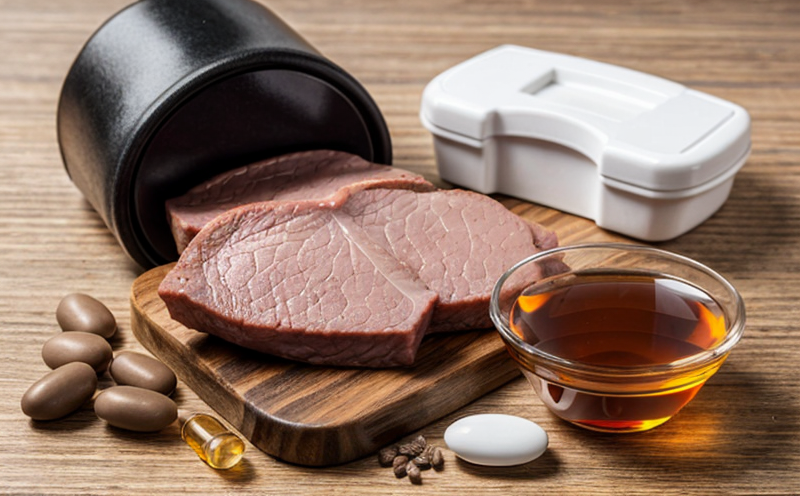Hepatic Enzyme Assays in Nutraceutical Testing
In the realm of nutraceutical testing, hepatic enzyme assays play a pivotal role. Hepatic enzymes are crucial for various metabolic processes within the liver. When evaluating nutraceutical products designed to support liver health or intended to interact with the body's hepatobiliary system, it is essential to measure these enzymes accurately.
The primary objective of hepatic enzyme assays in this context is to assess potential impacts on liver function. This involves measuring enzymes such as alanine aminotransferase (ALT), aspartate aminotransferase (AST), alkaline phosphatase (ALP), and gamma-glutamyl transferase (GGT). These enzymes serve as biomarkers for liver injury, toxicity, or disease. Understanding their levels helps in identifying potential hepatotoxic effects of nutraceuticals.
For instance, elevated AST and ALT levels can indicate hepatic cell damage while increased ALP might suggest bile duct obstruction or cholestasis. GGT is often used as a marker for alcoholic liver disease or gallbladder disorders. By incorporating these assays into the testing protocol, manufacturers can ensure that their products do not harm liver function.
The accuracy and precision of hepatic enzyme assays are critical. Laboratories must adhere to international standards such as ISO 15189:2012 for quality management systems in medical laboratories. These standards ensure that the tests meet stringent requirements for reliability and reproducibility.
Specimen preparation is also an important aspect of these assays. Blood samples are typically collected from healthy volunteers or patients under strict protocols to avoid any bias. The specimens must be processed promptly to prevent degradation of enzymes, which can lead to inaccurate results.
The instrumentation used for hepatic enzyme assays should comply with the latest technological advancements in analytical chemistry. Automated analyzers equipped with advanced software can provide rapid and accurate measurements. Calibration against reference materials ensures that the equipment delivers consistent results across different batches or shifts.
Reporting of results is another critical component. The report must include all relevant parameters measured, including normal ranges for comparison. It should also specify any deviations from expected values along with potential causes if discrepancies are found. This information helps stakeholders make informed decisions about the safety and efficacy of nutraceuticals.
Furthermore, hepatic enzyme assays contribute significantly to regulatory compliance. Regulatory bodies like the U.S. Food and Drug Administration (FDA) or European Medicines Agency (EMA) require comprehensive testing protocols that include hepatic function evaluations. Compliance with these regulations not only ensures product quality but also protects consumers from potentially harmful substances.
Given the complexity of nutraceuticals, which often contain multiple active ingredients, it is crucial to perform thorough assessments. This includes examining how individual components interact within the body and whether they influence hepatic enzyme activity positively or negatively.
Benefits
- Evaluation of Hepatotoxic Potential: Identifies risks associated with hepatotoxicity early in development.
- Safety Assurance: Ensures that nutraceuticals do not cause adverse effects on liver health.
- Regulatory Compliance: Meets stringent regulatory requirements for safety and efficacy.
- Quality Control: Guarantees consistent product quality through standardized testing processes.
- Patient Safety: Protects consumers from potentially harmful substances by ensuring safe products.
Why Choose This Test
Selecting hepatic enzyme assays for nutraceutical testing offers several advantages. Firstly, it provides a comprehensive evaluation of potential hepatotoxic effects, which is vital given the increasing popularity and diverse composition of these products. Secondly, this test ensures compliance with international standards, thereby enhancing credibility in the global market.
Thirdly, hepatic enzyme assays contribute to protecting consumer safety by identifying unsafe components early in the development process. Fourthly, they support quality assurance initiatives aimed at maintaining consistent product standards across different batches or production runs.
Lastly, this testing method aligns with regulatory expectations, facilitating smoother approval processes and broader market access. By incorporating hepatic enzyme assays into their quality management systems, manufacturers can demonstrate their commitment to producing safe and effective nutraceuticals.
Quality and Reliability Assurance
The reliability of hepatic enzyme assays is paramount in the context of nutraceutical testing. Laboratories must adhere to strict quality assurance protocols to ensure accurate and precise results. This includes regular calibration of equipment against reference materials, rigorous training for laboratory personnel, and adherence to standard operating procedures.
International standards such as ISO 15189:2012 provide a framework for achieving these goals. These standards emphasize continuous improvement through internal audits and external reviews. Regular participation in proficiency testing programs further ensures that laboratories maintain high levels of performance.
In addition to laboratory practices, specimen preparation plays a crucial role in maintaining assay reliability. Blood samples must be collected under controlled conditions to minimize variability. Proper handling, transportation, and storage are essential to prevent degradation of enzymes before analysis.
The instrumentation used for hepatic enzyme assays should also meet stringent quality criteria. Automated analyzers equipped with advanced software provide rapid and accurate measurements. These instruments must undergo regular maintenance and calibration to ensure consistent performance over time.





